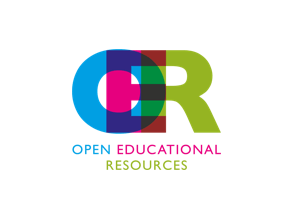What’s OER?
Open Educational Resources (OER) are learning materials, digital or physical, that range from individual lessons to textbooks to whole courses and curricula that are free to use and access. They may include text, images, animation, audio & video or a combination.
OER materials are either in the Public Domain or have copyright permissions that enable you to revise, redistribute or remix the content without seeking permission. Many OERs are copyrighted but have a Creative Commons license attached that enable you to distribute, reuse or modify the materials, as long as you credit the creator of the original OER. This means you can often adapt, modify or remix new materials into an OER that you adopt, and that your students can keep the text.
What is not OER?
Not all free or low cost learning materials are OERs. The ability to revise, remix, and redistribute is central to OER materials. Other free materials, like those licensed by the library or available freely online, does not allow for you to revise, remix, or redistribute. Materials that are free or low cost but have copyright restrictions can be considered affordable learning materials.
Affordable Learning Initiatives look to reduce costs for students by using low-cost or no-cost resources instead of commercial textbooks. The scope of material used may include OERs but also may include the following:
- Using library-licensed and purchased materials for course materials, including physical books, eBook, and electronic journal and magazine articles. Library licensed and purchased materials are bought by the institution, but are free for students to use.
- Using the library’s physical reserves. This allows physical texts from the library or the instructor to be used by students for a limited amount of time. The materials were purchased either by the library or the instructor, but are free for students to use.
- Using Youtube videos or other already made and freely viewable videos.
- Creating open content that can be used by students you are teaching or by other instructors or scholars.
- Institutional efforts to negotiate across-the-board lower costs for traditionally-published textbooks and materials.
United Nations Educational, Scientific, and Cultural Organization (UNESCO) Definition of OER
Open Educational Resources (OER) are learning, teaching and research materials in any format and medium that reside in the public domain or are under copyright that have been released under an open license, that permit no-cost access, re-use, re-purpose, adaptation and redistribution by others.
Open license refers to a license that respects the intellectual property rights of the copyright owner and provides permissions granting the public the rights to access, re-use, re-purpose, adapt and redistribute educational materials.
The Recommendation on OER, adopted by UNESCO’s General Conference at its 40th session on 25 November 2019, is the first international normative instrument to embrace the field of openly licensed educational materials and technologies in education.
To support Member States implementation of the 2019 Recommendation on OER, UNESCO established the OER Dynamic Coalition. The OER Dynamic Coalition aims to support networking and sharing of information to create synergies around the 5 areas of action of the recommendation: (i) building capacity of stakeholders to create, access, re-use, adapt and redistribute OER; (ii) developing supportive policy; (iii) encouraging inclusive and equitable quality OER; (iv) nurturing the creation of sustainability models for OER, and (v) facilitating international cooperation.





